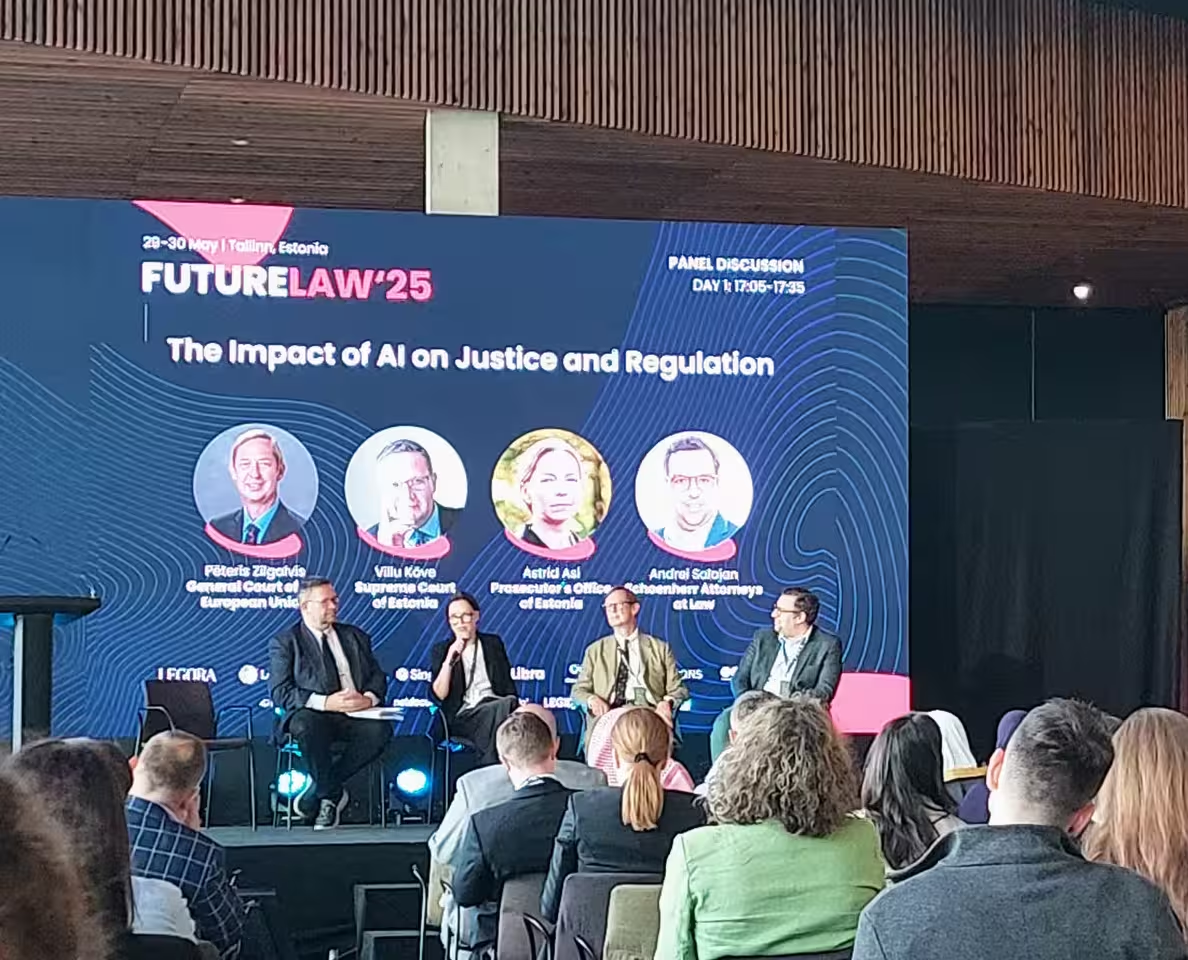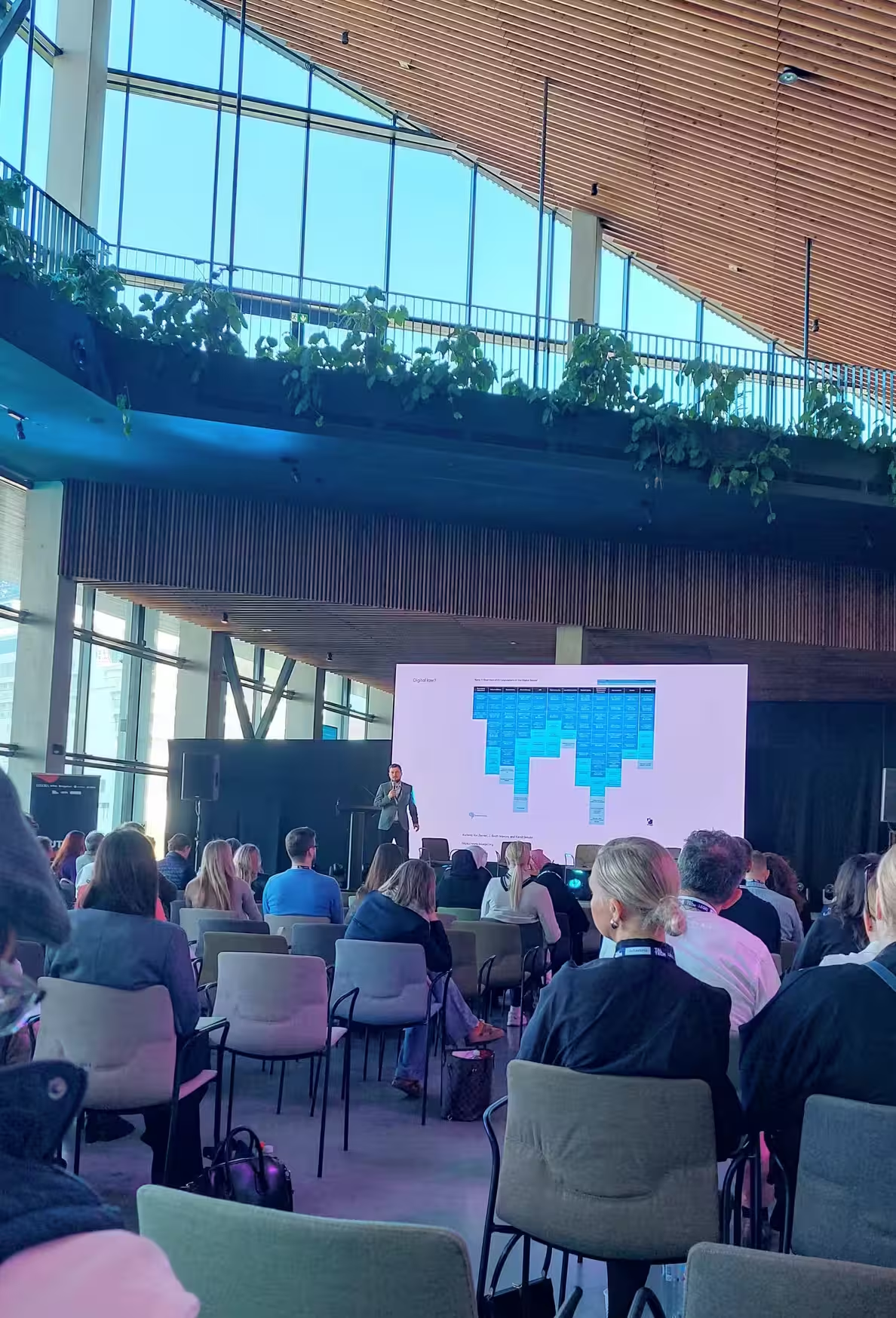First time in Tallinn, first time at FutureLaw - truly impressed by both!
The event provided a balanced and comprehensive overview on the current legaltech landscape, with the participation of representatives from both the legal sector and legal technology providers.
The main stage hall provided a wonderful view to the Tallinn Cruise Harbour, and the old town of the city - a UNESCO World Heritage Site - was just a short walk from the conference venue.

Future lawyers need to combine legal, technical and strategic skills
In the interactive workshop “Tech Literacy for Modern Lawyers” hosted by Ebru Metin, Researcher at TalTech, we discussed the biggest challenges of integrating new tools into the existing workflow. The speaker emphasized that it is important to always involve a technical person when adopting a new solution, which is advantageous for both the education on new tools and for the seamless integration with the existing environment.
Legal research as a fundamental pillar and the baseline in legal work
I am particularly interested in legal research and EU legal data, so I was happy to listen to the presentation of Leif-Nissen Lundbæk, Co-Founder/CEO at Xayn, about the future of legal research. Research is not only a separate element of the daily workflow but a central component when drafting or reviewing a contract.
When using AI for legal research, it is very important to train the model with legal data relating to the relevant jurisdiction. However, the main issue with AI-based legal research is the gap of transparency. An AI model can learn how a contract looks like, but it doesn’t know why - that’s why certain providers try to train the model on the way of legal thinking.
Walking a very fine line when deciding when to trust AI
The panel on the Impact of AI on Justice and Regulation was extremely insightful and inspiring for me.
Pēteris Zilgalvis, judge at the General Court of the European Union shared that the Court of Justice has started implementing a pilot-project in the framework of the AI-strategy at the CJEU. The new solution is based on two open weight models and operates on a sovereign cloud in the European territory. The aim of the project is to utilize the technology to provide easier access to justice for the benefit of EU citizens. As a first step, an AI-based tool will be made available internally to facilitate legal research and summaries.
However, the panelists highlighted that the AI results have to be continuously verified and human critical-thinking needs to be applied, in order to avoid the risk of over-reliance on the machine output. It was also pointed out that judges have to understand their judgment and have to be able to explain it, something which cannot be done by the machine.

The role of translation and multilingualism was also emphasized by all panelists, articulating the need for reliable and trustworthy translations in the judicial process.
At the Court of Justice of the EU, there are 24 procedural languages, but the working language is French, which means that all documents need to be translated into French. In this process, Machine translation is utilized, followed by revision by professional translators.
As the co-founder of the EU terminology search tool Juremy.com, and a freelance lawyer-linguist for the CJEU myself, the subject of multilingualism was of course particularly interesting for me. Knowing that many lawyer-linguists who work for the CJEU use Juremy for translating and revising court documents, it is particularly relevant for us to keep up-to-date with the language strategy adopted by the EU institutions.
Astrid Asi, Prosecutor General of Estonia pointed out that in case of low-resource languages like Estonian, it is hard to find enough linguists for court procedures, that’s why English is often used as a pivot language. She also shared that the fact that Estonia is so well-versed in digitalization is partly due to the lack of human resources in the country, and hence the motivation to replace manual tasks with automation.
Villu Köve, Chief Justice of the Supreme Court of Estonia highlighted that since the amount of newly adopted law even in specialized fields is enormous, and the amount of evidence submitted by the parties is more and more time-consuming to process, AI tools are expected to help lawyers to find out what the case is really about.
However, when using AI for search and translation use cases, there is always that nagging feeling that says: “It looks so convincing - but is it not a hallucination? Let’s check this!”
Based on my experience in legal translation, it is exactly this unsettling feeling, resulting from the fact that the AI-output might be wrong, which puts a significant cognitive load on linguists. That’s why they need reliable resources to ensure that the final text is correct and accurate.
The panelists concluded that in the above scenarios AI can have an important role, however finding the fine line of when to trust the ‘machine’ and when not remains a very delicate question.

The crucial role of training in cooperation with tool providers
On this note, the role of training was highlighted by Nathalia Schomerus (Legora - Legal Innovation) in the panel “Success Stories in Legal Tech Adoption”. It is indeed very important to check AI output, but AI-adoption projects can fail because lawyers are not being trained how to do that verification.
I think, and this goes to the translation profession alike, there should be more talk about the particular process of checking AI results and how to ensure efficient ways to check the relevancy and reliability of the AI-output.
Limitations of LLMs were also discussed during the conference
Remember: LLMs are trained on publicly available information, which doesn’t necessarily include hands-on legal knowledge or real-life expertise. We need to add these to the formula ourselves. Asking the AI to adopt a certain contract to a specific national legislation most likely won’t work, since the LLM doesn’t have the specific “knowledge” and expertise relating to a certain jurisdiction.
There are initiatives to enhance these capabilities of LLMs by specific training data, and we will see in the future how these models perform on specific tasks.
Finally, and more generally, human relationships and responsiveness are key when providing services. Whether working in the legal or technical domain, or both, we need to be more human now than ever.
Thank you to the organizers of the event at FutureLaw, for putting together such an inspiring and versatile professional forum!


